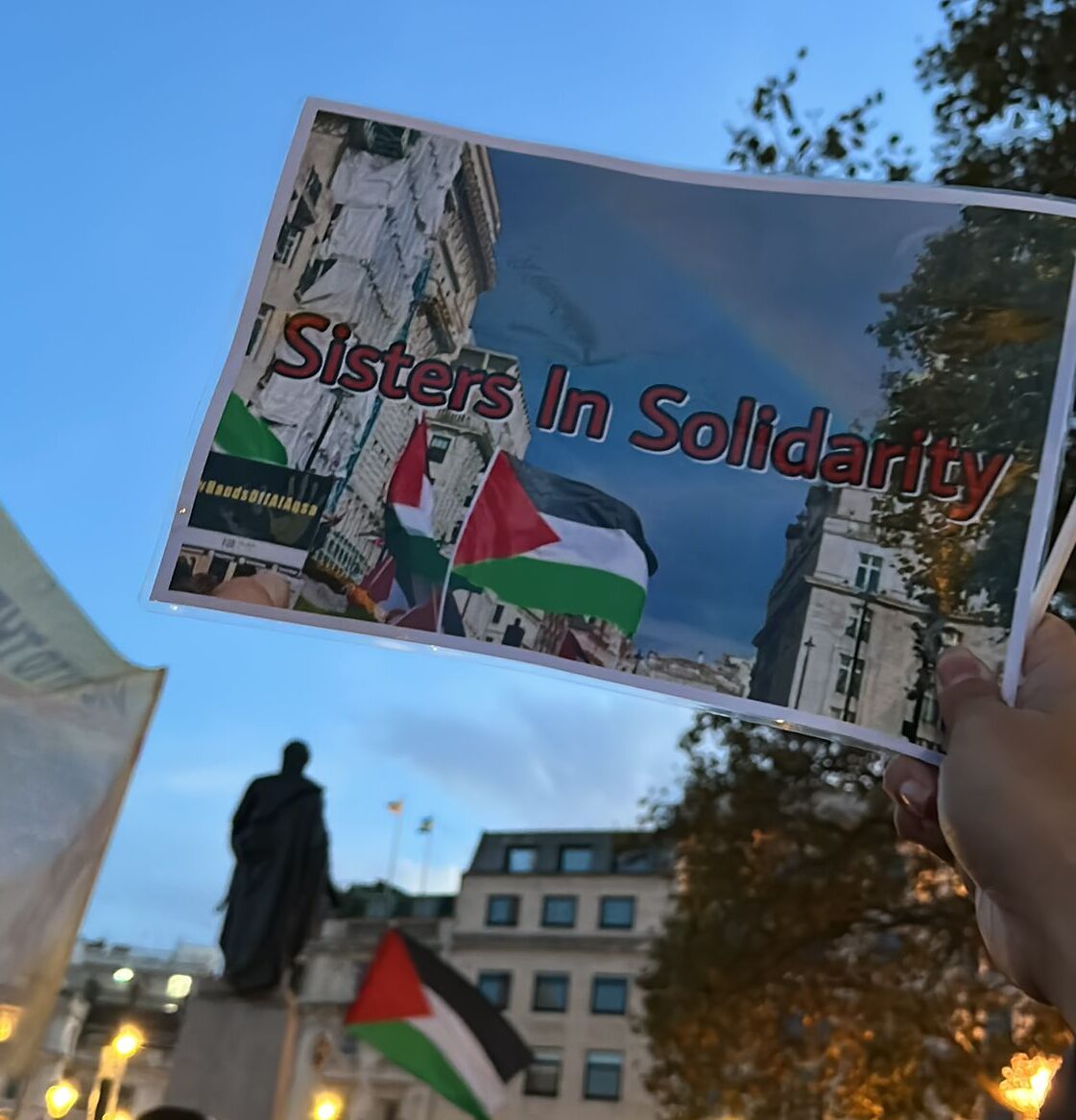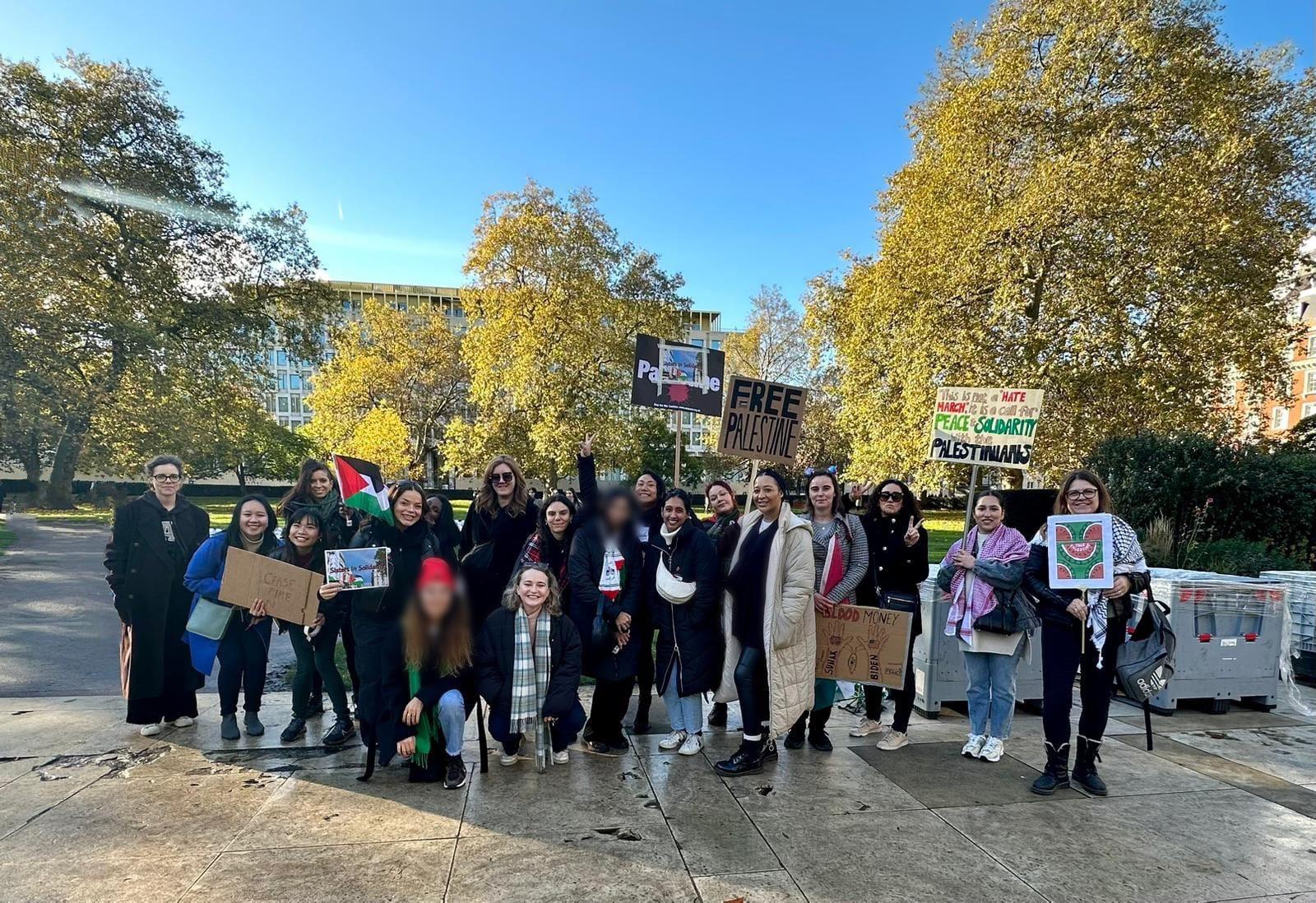

A group of women, wary about attending Palestine protests in London alone, has started a an online community to support and encourage females to join the marches.
Sisters in Solidarity (SiS) was born after a friend asked Juliana Camero if she could accompany her to the pro-Palestine march at Trafalgar Square as she didn’t want to go alone.
“I remember being on the tube and thinking to myself ‘Someone should start a group where women can march together to feel safer,’ and then I realised I could be that person. I had been active on social media by sharing posts about Palestine and was determined to attend the march on November 4,” Camero recounted.
Although Camero struggles with anxiety and is not an extrovert, she decided to go ahead with the idea, as that would encourage more people to stand up for Palestine.
Realising that a protest march can be unsettling for women who are new to such experiences, Camero said: “A lot of women might not feel confident about attending protest marches alone because going anywhere as a woman can be scary in itself. Although the marches are safe, it can be an anxious experience for people who aren’t used to being alone in this atmosphere.”
Though Camero was ready to go alone to the protest action held on November 4, she said she felt a slight relief after her friend and cousin reached out to accompany her during the march.
In 2022, a higher proportion of women felt less safe than men walking alone in all settings after dark, with 27 per cent of females experiencing at least one form of street harassment, as per the latest data from the Office for National Statistics.
Camero, an executive assistant, shared the idea on Instagram stories and TikTok and commented on a post related to the march by the Palestine Solidarity Campaign page.
The huge response, including from males, took her by surprise.
“I don’t have a large following on social media, so I didn’t expect many people to reply. But comments kept pouring in, and people shared it to their stories,” she noted with a hint of disbelief.
Camero initially created a group chat on Instagram as she knew that women wouldn’t be comfortable sharing their personal numbers. To ensure the safety of the members, she ran a background check through their social media profiles. “I had to verify some people through their Facebook profiles as they weren’t active on Instagram. It’s not a foolproof method, but it’s better than nothing,” she added.
Overwhelmed and bombarded with requests to join the community, she asked her friend Zsanett Horvath for help managing the group chat, which was soon moved to WhatsApp. Currently, there are around 100 members each on both Instagram and WhatsApp groups.
Horvath was forced to skip the Palestine solidarity march on October 14 because she was apprehensive about going alone. With Camero, Horvath helped organise the first official protest march for SiS at Trafalgar Square.

Currently, Sisters in Solidarity has around 100 members each on both their Instagram and WhatsApp groups.
(Credits: SiS)
“People bring their children and families to the protests. I even marched along with an 80-year-old grandmother chanting for a free Palestine,” she added, stressing the fact that Palestine protests are, in fact, safe to attend alone. The only worry is the people who commit hate crimes to paint the marches as ‘violent’, according to Camero.
“In the November 11 march, we were worried about the far-right elements but didn’t encounter any violence. We always try to stay together, outside the main circle, to protect our sisters in case of any untoward incidents.”
In a span of a few days, the group has blossomed into a sisterhood. “Some of us have lost loved ones over the difference in political views, so we find comfort in the community knowing that all of us share the same morals and values. We uplift one another,” Camero said.
Horvath believes that SiS provides a safe space to vent. “London is a lonely place and people are at risk of even losing their jobs if they discuss and speak up against genocide.”
Hannah Warman, a 50-year-old support worker, agrees. She joined SiS after spotting the group in one of the Instagram comments.
“I came across SiS when I was struggling to deal with the horrific devastation in Gaza for several weeks alone. I had no one to vent to as none of my friends were interested in the cause.”
Warman initially attended two protests alone and the last two marches with SiS. She described the SiS march as a “powerful experience” of meeting like-minded women sharing collective pain and rage.
”I don’t know how I would have coped without them,” Warman shared.
Expressing gratitude for the women, Camero said: “It’s a bittersweet, heartwarming moment because it is a shame we had to come together in depressing circumstances.”
Emma Carlisle has attended three protests with SiS so far. The 26-year-old engineer said: “It was comforting to talk to people with similar political views. I also love participating in the conversations flowing in the various subgroups.”
The original community now has several subgroups for self-love, delegating tasks, expanding social media reach, fundraising for medical aid in Gaza, sharing resources to support Palestinian businesses, and for mothers who wish to join the protests.
Camero has also started selling not-for-profit merchandise to donate the proceedings to the Human Appeal Emergency Gaza fund.
As a collective, the women have decided to forge ahead even when Palestine is free because – as the SiS founder defiantly asserted: “There is always something to fight for.”